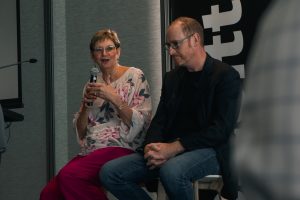Given the changes to our personal and work lives due to COVID-19, this year’s RU OK? Day theme, ‘there’s more to say after RU OK? ‘, is a timely reminder to keep talking to and connecting with friends, family and work colleagues.
Earlier this year, we co-hosted a mental health event for health professionals to raise awareness of youth mental health in the workplace.
Little did we know that the workplace as we knew it was about to change significantly and these messages continue to ring true in a COVID-19 world where the way in which people work continues to evolve.
An expert panel, comprising Dr Peggy Brown, a psychiatrist with high-level experience in designing better mental health systems, and Associate Professor Matt Coleman, a specialist in substance use disorders and co-occurring mental health problems, focused on how to make the workplace mentally healthy for young employees.

Dr Brown said if young people were engaged and believed in what their employer stood for, and the work environment was good, they would be more likely to thrive, even if they were facing external challenges.
“It is not necessarily the bright, shiny things they value but rather the culture, leadership, support, workload, job design and protection from bullying and harassment.
“The ability to connect with peers is also important as good team functioning builds resilience and creates an environment where employees feel safe to talk about their mental health.”
Associate Professor Coleman said conversely, stigma in the workplace could be overwhelmingly damaging.
“It can leave people feeling like they’re not valued or connected,” he said.
“It reduces understanding between people and therefore reduces good working relationships and collaboration between teams and team members.
“Encouraging a work environment where employees feel comfortable and safe to talk about their stress and mental health benefits the entire workplace.”
The panel talked about how to prevent or intervene early in mental health issues, and why creating a mentally healthy workplace for the next generation would increase productivity and improve retention.
Associate Professor Coleman said understanding, promoting and communicating about mental health needed to be a part of core business.
“Employees will be physically unwell throughout the year, just as much as they will be unwell due to mental ill health,” he said.
“It is to an employer’s benefit to know when people are no longer functioning and work with them back to their best health and best mental health.
“Dealing with it, being flexible and willing to offer alternative conditions will not only help the employee, but the business overall.”
It is more important than ever that the advice from Dr Brown and Associate Professor Coleman is followed and employers make it a priority to support staff wellbeing.
WA Primary Health Alliance recently made the decision to adopt a hybrid or flexible model of working, following significant consultation with staff.
Importantly, ongoing support for managers and team members to continue to adapt to this new way of working was highlighted as being critical to our success, our connectedness and our wellbeing.
Find out more about our approach to working remotely.
